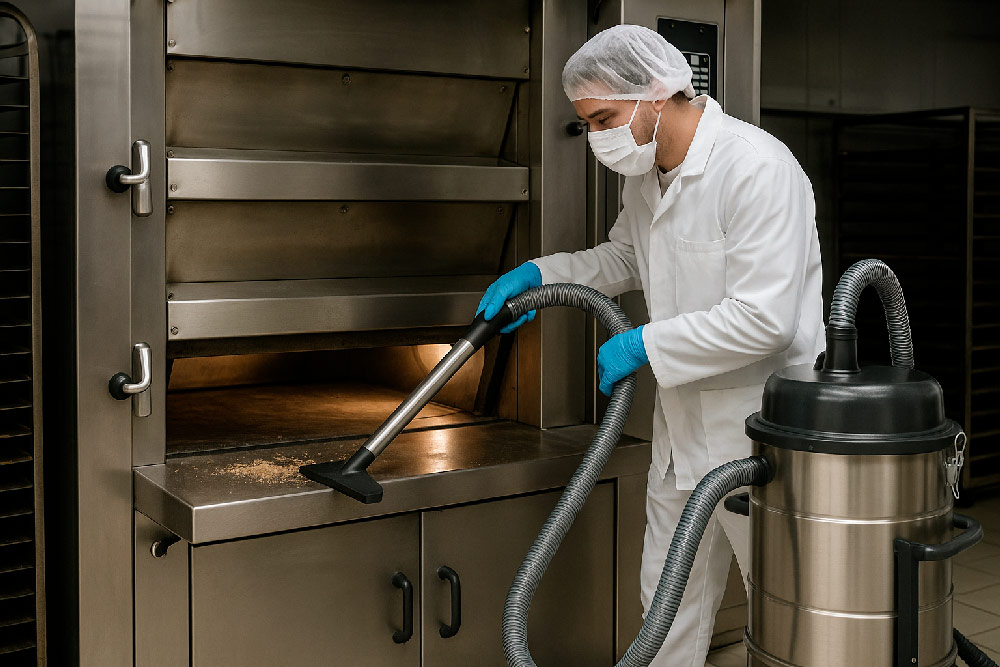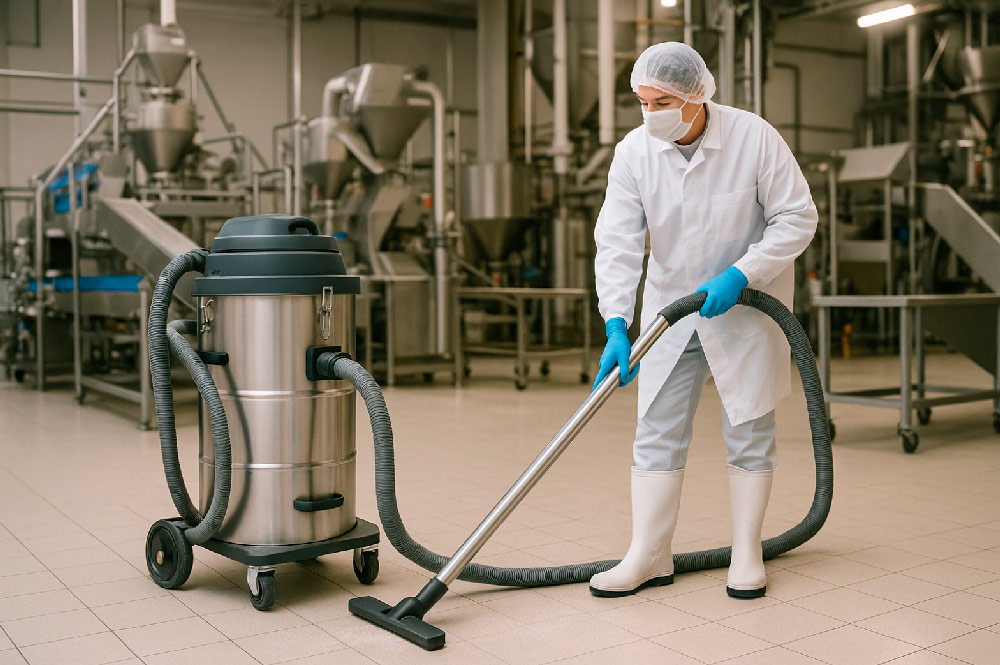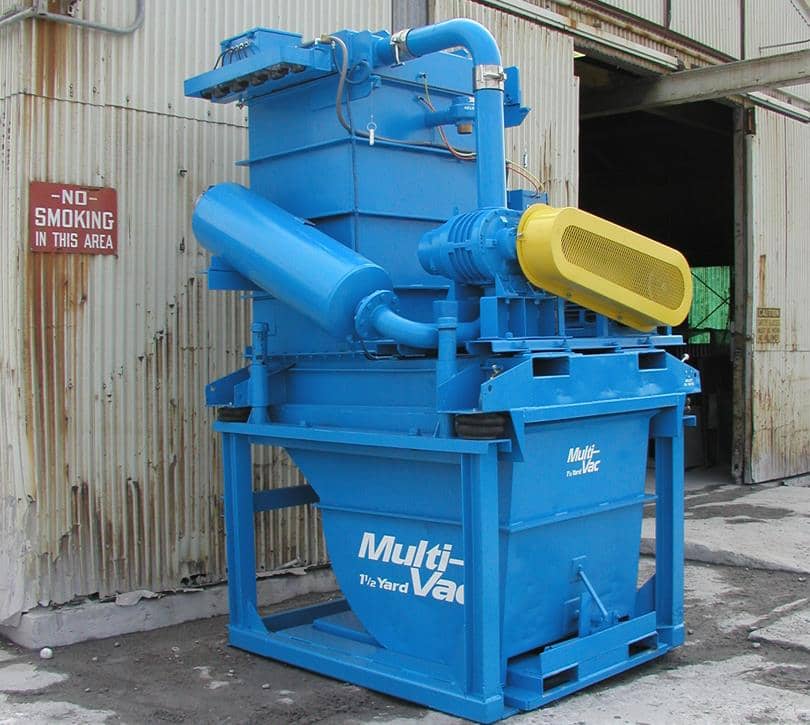We have been monitoring the industrial vacuum cleaner market in Australia and overseas for 20 years now and have been impressed by the trends in recent years regarding the use of industrial vacuum cleaners in the food industry.
As suppliers of industrial vacuum cleaners, we have some thoughts on this matter that we would like to share.
1. What is the overall demand for industrial vacuum cleaners in the food industry?
The global market for industrial vacuum cleaners in the food industry is projected to experience significant growth between 2025 and 2030. This expansion is driven by increasing hygiene standards, stringent food safety regulations, and the need for efficient cleaning solutions in food processing facilities.
Technological advancements, such as the integration of automation and smart features in vacuum systems, are also contributing to market growth. The demand for specialized industrial hygiene equipment like dust collector systems and industrial vacuums is rising, particularly in sectors like meat processing and bakeries.
Also, portable vacuum cleaners are expected to witness the highest growth during this period. The Asia-Pacific region is anticipated to experience the most significant growth due to urbanization, changing consumer lifestyles, and investments in advanced cleaning technologies to ensure food safety and meet international cleanliness standards.
1.2. Impact of COVID-19 on the growth of vacuum cleaner use in the food industry
During COVID-19 food processing facilities intensified their cleaning protocols to prevent contamination, thereby boosting the demand for efficient industrial hygiene equipment. The pandemic accelerated the implementation of advanced vacuum systems designed to meet heightened sanitation requirements.
Industrial vacuum cleaners are now widely used not only for cleaning production areas but also for transporting powders and granules, and for the suction of food waste.
If we look at the situation from the point of view of the global health organization, COVID-19 will not be the first pandemic in this decade and what is happening should be considered the beginning of a global trend.

2. What certifications must vacuum cleaners obtain to be used in the food industry?
In Australia, vacuum cleaners used in the food industry must comply with specific standards to ensure safety and hygiene. Key certifications include:
- ISO 22000: Specifies requirements for a food safety management system.
- HACCP (Hazard Analysis and Critical Control Points): A systematic preventive approach to food safety.
- AS/NZS 4024: Australian/New Zealand standard for safety of machinery.
- IECEx: confirms that equipment is safe to use in explosive atmospheres globally, following international IEC standards for hazardous environments.
- ATEX: demonstrates compliance with European Union directives for equipment used in potentially explosive atmospheres, ensuring safety against ignition from dust or gases.
Comparatively, in the United States, vacuum cleaners must adhere to:
- FDA regulations: Ensure industrial hygiene equipment is safe for food contact.
- OSHA standards: Focus on occupational safety and health.
- NSF certification: Ensures products meet strict standards for public health protection.
The table below summarizes the certifications:
| Certification | Australia | United States |
| ISO 22000 | ✔️ | ✔️ |
| HACCP | ✔️ | ✔️ |
| AS/NZS 4024 | ✔️ | ✔️ |
| FDA | ✔️ | ❌ |
| OSHA | ❌ | ✔️ |
| NSF | ❌ | ✔️ |
| IECEx | ✔️ | ✔️ |
| ATEX | ✔️ | ✔️ |
3. In what types of food industries can industrial vacuum cleaners be used?
Industrial vacuum cleaners are versatile tools utilized across various sectors of the food industry. Their applications include maintaining cleanliness, ensuring food safety, and complying with hygiene standards.
Below is a comparative table highlighting their uses in different food industry types:
| Food Industry Type | Applications of Industrial Vacuum Cleaners |
| Bakeries | Cleaning ovens, removing flour dust, maintaining hygiene on production lines. |
| Meat Processing | Removing meat scraps, cleaning processing equipment, ensuring sanitary conditions. |
| Dairy Plants | Cleaning milk spills, maintaining sterile environments, preventing cross-contamination. |
| Confectionery | Removing sugar dust, cleaning mixing equipment, ensuring product purity. |
| Beverage Industry | Cleaning bottling lines, removing liquid spills, maintaining clean production areas. |
| Seafood Processing | Removing fish scales, cleaning processing tables, preventing odor buildup. |
Utilizing the best industrial vacuum for restaurants and food processing vacuums enhances industrial hygiene and operational efficiency.
4. How well do commercial vacuum cleaners cope with Dusts?
What we are often asked by food industry owners is whether a vacuum will create even more dust. After all, if you turn on a regular vacuum cleaner, it removes relatively large dust particles but spreads smaller ones around the room. So is a commercial vacuum cleaner suitable for, say, flour?
The answer to this question is not as obvious as it might seem and there have been several studies on this subject in recent years.
Dust protection filters in industrial vacuum cleaners for the food industry have evolved significantly to meet stringent food safety, occupational health, and industrial hygiene standards. For example, High-Efficiency Particulate Air (HEPA) filters are capable of capturing 99.97% of particles ≥0.3 microns.
A recent study found that repeated HEPA vacuuming alone reduced dust loading by approximately 55.5%, polycyclic aromatic hydrocarbons (PAHs) by 58.6%, and house dust mite (HDM) allergens by 80.8% in carpets. However, vacuuming can sometimes lead to the resuspension of fine particles into the air, potentially affecting indoor air quality
On the other hand, wet cleaning methods can introduce moisture, which may promote the growth of mold and dust mites if not properly managed. A case study highlighted that after wet cleaning, there was an increase in house dust mite populations, likely due to the elevated humidity levels.
In general, studies in recent years are increasingly leaning towards the fact that cleaning premises with industrial vacuum cleaners is more effective in comparison with standard cleaning methods
4.1. What about cross-contamination filters?
In the context of the above studies, it is important to consider that industrial vacuum cleaner filters for the food industry take into account cross-contamination
There are specialized filters used in vacuum cleaners to prevent the transfer of contaminants between different areas or products. They are essential in the food industry to maintain product integrity and comply with hygiene regulations by ensuring that allergens, microbes, or other contaminants are not spread during cleaning processes.
A study discussed in ISHN outlines the importance of filter orientation and design in controlling cross-contamination. Vertically mounted, wide-pleated cartridge filters are recommended for their efficiency in capturing and releasing dust. The use of secondary HEPA filters is also advised to ensure that recirculated air is free from contaminants. The article stresses that such filter configurations can significantly reduce the risk of cross-contamination in facilities processing both allergen-free and general food products
5. Benefits of using vacuum cleaners in the food industry
| Benefit | Description |
| Enhanced Hygiene | Industrial vacuum cleaners help maintain cleanliness, reducing the risk of contamination. |
| Compliance with Regulations |
Use of certified equipment ensures adherence to food safety standards.
Quick and effective cleaning processes save time and labor. |
| Efficiency | Quick and effective cleaning processes save time and labor. |
| Versatility | Suitable for various applications, including dry and wet waste removal. |
| Improved Air Quality | Advanced filtration systems enhance air quality in processing areas. |
| Cost Savings | Reduces the need for manual cleaning, lowering labor costs. |
6. How long will such a vacuum cleaner last and how difficult is it to maintain?
The lifespan of an industrial vacuum cleaner in the food industry typically ranges from 5 to 10 years, depending on usage and maintenance. Regular maintenance, including filter changes, hose inspections, and motor checks, is crucial for longevity. While maintenance requires diligence, it is generally straightforward, and many manufacturers provide guidelines to facilitate proper upkeep.
If you are looking for a reliable industrial vacuum cleaner supplier, the ACS team can help you. You can take a look at our products on the website or write to us directly to discuss your specific needs – very often clients are looking for something custom that would best suit their specific business and we always try to accommodate.



